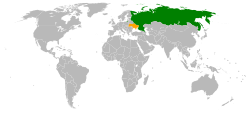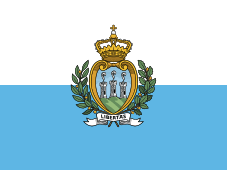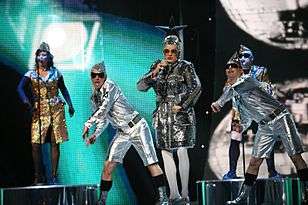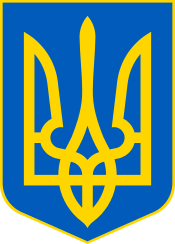Russia–Ukraine relations in the Eurovision Song Contest
Russia has participated in the Eurovision Song Contest, a pan-European music competition, since 1994, while Ukraine has participated since 2003. Russia and Ukraine have had positive relations, and have exchanged the top-3 points with each other several times over the years. Barring a minor dispute over Ukraine's 2007 entry "Dancing Lasha Tumbai" (whose title was alleged to be a mondegreen of "Russia goodbye", but was defended by its performer as being meaningless), notable conflicts began to emerge between the two countries at Eurovision in the wake of Russia's 2014 annexation of Crimea from Ukraine.
 | |
Russia |
Ukraine |
|---|---|
In 2016, Ukraine's entry was "1944", a song by Jamala that was inspired by her great-grandmother's experiences during the deportation of the Crimean Tatars by the Soviet Union. The song was criticised by Russian officials, who argued that it violated Eurovision rules against political content due to its allusions to the Crimean crisis. "1944" would ultimately win the contest. While there were calls for Russia to boycott the Ukraine-hosted 2017 contest over the ongoing conflicts in Eastern Ukraine, Russia did unveil an entrant—Yuliya Samoylova.
However, after she was unveiled, it was reported that Samoylova had been banned from entering Ukraine for three years for violating a Ukrainian ban on direct travel to Crimea from Russia. The EBU attempted to reconcile the issues so that Samoylova could perform, calling upon the Ukrainian government to remove or defer her travel ban for the contest, and offering Russia the opportunity to perform their song from a remote venue. However, Russia's delegate broadcaster, Channel One Russia, passed on the offer, wanting to have Samoylova perform in Kiev as with all other entrants. On 13 April 2017, Channel One announced that it would not broadcast the contest, effectively withdrawing.
Prior to the 2019 contest in Tel Aviv, a city with large communities from Russia and Ukraine, Ukraine retracted its entry, Maruv, who had been prominently Russian based, after she refused to sign a contract, having been questioned on her views on Crimea by Jamala, one of the judges of the selection process; this caused Ukraine to withdraw from the contest for the first time since 2015.[1]
2007 contest
Verka Serduchka was chosen to represent Ukraine at the 2007 Contest with the song "Dancing Lasha Tumbai". However, it was alleged that the song had contained political subtext, including a reference in its lyrics to "Maidan" (the site of the Orange Revolution demonstrations), and that the phrase "Lasha Tumbai" was a mondegreen of "Russia goodbye".[2] Serduchka denied these allegations, claiming that the phrase "lasha tumbai" was Mongolian for "churned butter".[2] On the Russian talk show Пусть говорят, which aired on Channel One Russia just after the final of the contest, a native Mongolian speaker explained that the phrase "Lasha Tumbai" does not exist in the Mongolian language.[3] Serduchka later stated that "Lasha Tumbai" was a meaningless phrase meant to rhyme with other lyrics.[4]
2016 contest

Jamala, who represented Ukraine at the 2016, won with the song "1944". The lyrics for her song concern the deportation of the Crimean Tatars, in the 1940s, by the Soviet Union at the hands of Joseph Stalin because of their alleged collaboration with the Nazis.[5] Jamala explained that the lyrics were inspired by the story of her great-grandmother Nazylkhan, who was in her mid-20s when she and her five children were deported to barren Central Asia. One of the daughters did not survive the journey.[6] Eurovision's official rules state that "no lyrics, speeches, gestures of political or similar nature shall be permitted,"[7] so Jamala repeatedly stated that her song was not referencing the 2014 annexation of Crimea, but her own personal family history. She stated, "I needed that song to free myself, to release the memory of my great-grandmother, the memory of that girl who has no grave." [8] However, at the same time she did reference the current state of Crimea post-annexation, saying "Of course [the song is] about 2014 as well." [9] "Now the Crimean Tatars are on occupied territory and it is very hard for them. They are under tremendous pressure. Some have disappeared without a trace. And that is terrifying. I would not want to see history repeat itself." [10]
Russian officials, including multiple MPs and Maria Zakharova, the spokesperson of the Ministry of Foreign Affairs, were clearly unhappy with the decision and said the song was a political statement and an allusion on the 2014 annexation of Crimea, forbidden by the rules of the contest. Zakharova wrote in a Facebook post that the next Eurovision winner might as well be about the conflict in Syria, proposing the lyrics: "Assad blood, Assad worst. Give me prize, that we can host."[11] Other officials suggested boycotting the 2017 contest, with Franz Klintsevich, deputy chairman of the Federation Council Committee on Defense and Security stating, "It was not the Ukrainian singer Jamala and her song 1944 that won Eurovision 2016, it was politics that beat art. If nothing changes in Ukraine by next year, then I don't think we need to take part." [12]
Despite this, Russia's entrant Sergey Lazarev, who placed third in the competition, congratulated Jamala on her win.[13][14]
2017 contest

The Russian military intervention in Ukraine, which began in late February 2014, prompted a number of governments to apply sanctions against individuals, businesses and officials from Russia. In 2015, the Ukrainian government began to blacklist people who supported the 2014 annexation of the Crimea by Russia, from entering the country.[15][16] Deputy Prime Minister Vyacheslav Kyrylenko stated that the country would not lift this ban for the 2017 Eurovision Song Contest. The European Broadcasting Union (EBU) iterated that their goal was for Eurovision to remain inclusive, and that they were "engaging in constructive dialogue with the National Public Broadcasting Company of Ukraine (NTKU) and the Ukrainian authorities to ensure that all delegates and artists can come and stay in Ukraine". A representative of the host broadcaster told Billboard that the blacklist rules were beyond their control.[17] On 3 March 2017, Russian politician Vitaly Milonov called upon the country to withdraw from the 2017 contest amid fears of the ongoing conflict in Eastern Ukraine. He described Russia as being "unwelcome guests in a country seized by fanatics".[18][19]
Russian selection, travel ban
It was reported on 13 March 2017 that Ukraine was investigating Yuliya Samoylova, Russia's entrant at the Eurovision Song Contest 2017, for having violated a ban on direct travel to Crimea from Russia; she had visited Kerch in 2015 to give a performance.[20][19] Ukrainian officials have speculated that Russia's choice of Samoylova may have been a deliberate political statement, having knowingly picked a singer who had performed in the disputed territory in order to instigate a political controversy; interior minister adviser Anton Gerashchenko stated that he could not "exclude that actions could be taken by our side to deny her entry" if Russia was using the entry as a "provocation", while the deputy director of ATR, a Ukrainian television broadcaster that serves the Crimean Tatar population, argued that it was a "cynical and immoral move". Minister of Foreign Affairs of Ukraine Pavlo Klimkin stated that he considers the choice of Yulia Samoilova as the Eurovision participant is most likely to be a provocation from Russia.[21] Later the President of Ukraine Petro Poroshenko stated the same.[22] Ben Royston, who had advised past Eurovision delegations in Azerbaijan and Sweden, argued that Russia's choice of a performer with a disability may have also been deliberate, explaining to The Guardian that "[Russia] chose a wheelchair-bound contestant who had made pro-Russian statements about Crimea on social media. She was never going to be allowed in Ukraine, but they chose her anyway. And now Russia are very publicly saying: 'How can Ukraine let this poor sweet girl in a wheelchair be the victim of your laws?' It seems clearly all part of the Russia PR machine."[23] Russia has denied that their choice of performer was meant to be a political statement,[24][25] and stated that their choice of a performer with a disability was meant to be an expression of diversity.[23]
The Security Service of Ukraine (SBU) confirmed on 22 March 2017 that Samoylova had been banned from entering Ukraine for three years for illegally travelling to Crimea from Russia, thus violating article 204-2 of Code of Ukraine on Administrative Offenses.[26][27][28] The EBU responded by stating that it was continuing to ensure that all entrants would be able to perform in Kiev, but that "we are deeply disappointed in this decision as we feel it goes against both the spirit of the contest and the notion of inclusiveness that lies at the heart of its values", and also stated that EBU will respect the laws of hosting country.[29][30] Frants Klintsevich, First Deputy Chairman of the Federation Council Committee on Defence and Security, threatened that Russia would boycott Eurovision unless its organisers declared the government decision to be "unacceptable". He also accused them of being "completely politicised and biased".[31]
Attempts to reconcile
The EBU offered a compromise to Channel One Russia on 23 March 2017, in which Samoylova would be allowed to perform remotely from a venue of the broadcaster's choice; it would have been the first time that a Eurovision entry had been performed from an outside venue via satellite.[32][33] However, Channel One declined the offer, arguing that Samoylova should be allowed to perform on-stage in Kiev as with every other entrant, and accusing Ukraine of violating assurances in the Eurovision rules that all performers would be issued the appropriate visas so they could enter the host country.[34] Vice Prime Minister Vyacheslav Kyrylenko had stated that it is illegal for persona non grata to participate in tours or television programmes.[35] Jon Ola Sand, executive supervisor of Eurovision, stated in an interview with Denmark's national broadcaster DR, that he and other members of the European Broadcasting Union had contacted the Ukrainian Security Services about the possibilities of delaying the imposed ban until after the 2017 contest had concluded.[36][37]
EBU general director Ingrid Deltenre stated that Ukraine's behaviour was "absolutely unacceptable", and abused the Eurovision Song Contest ethos for "political action". Deltenre further went on to say that the EBU were in talks with Ukrainian prime minister Volodymyr Groysman and president Petro Poroshenko, in regards to delaying the ban until after the contest.[38] On 1 April 2017, Deltenre threatened to ban Ukraine from future competitions if Samoylova is not allowed to participate.[39] In response to this UA:PBC urged the EBU to respect the sovereignty of Ukraine.[40]
Withdrawal
In an interview with German newspaper Der Tagesspiegel published on 26 March 2017, Eurovision Reference Group chairman Frank-Dieter Freiling noted that Russia's participation in the contest seemed to be unclear, acknowledging that Samoylova had not participated in mandatory previewing sessions prior to the ban, nor had the Russian delegation reserved any accommodations in Kiev for the contest. He suggested that Russia may have been aware that their selection would be problematic.[41][42]
On 13 April 2017, Channel One announced that it would not broadcast the 2017 Eurovision Song Contest. The EBU considered the decision to be an official withdrawal from the contest.[43][23]
Reactions from other EBU members




2019 contest

Controversy emerged during the Ukrainian national selection for the Eurovision Song Contest 2019 regarding contestants' ties to Russia. During the final of the competition on 23 February 2019, jury members Jamala, Andriy Danylko, and Yevhen Filatov interrogated several of the contestants regarding their thoughts on Russia, focusing mainly on Maruv and Anna Maria. Jamala asked Maruv whether Maruv believed Crimea was Ukrainian territory, to which Maruv agreed. Anna Maria were asked, if they had to choose between the two, would they choose their country of Ukraine or their mother, who worked for the Russian-led government of Crimea. During the final, it was announced by the Ukrainian broadcaster, UA:PBC, that the broadcaster had reserved the right to change the decision made by the jury and Ukrainian public.
After Maruv was declared the winner of the competition, it was confirmed she was not yet confirmed as the Ukrainian representative, and discussions would take place between Maruv and the Ukrainian broadcaster. It emerged that Maruv's representative was sent a contract which she had a 48 hour deadline to sign in order to represent Ukraine. A major feature of the contract was that she must cancel all upcoming performances and appearances in Russia within 24 hours.[48] Maruv later revealed that the broadcaster's contract had additionally banned her from improvising on stage and communicating with any journalist without the permission of the broadcaster, and required her to fully comply with any requests from the broadcaster. If she were to not follow any of these clauses, she would be fined ₴2 million (~€67,000). Maruv also stated that the broadcaster would not give her any financial compensation for the competition and would not pay for the trip to Tel Aviv.[49]
On 25 February, both Maruv and the broadcaster confirmed that she would not represent Ukraine in Israel due to disputes over the contract, and that another act would be chosen.[50] Viktor Taran, a board member for UA:PBC, later revealed that Maruv refused to cancel her concerts in Russia which led to her refusal to sign the contract. Taran also alleged that Maruv and her lawyers did not believe she was responsible for representing the views of the Ukrainian government while at the Eurovision Song Contest.[51]
National final runner-up Freedom Jazz announced on 26 February that they had rejected the broadcaster's offer to represent Ukraine as well, with third place finisher Kazka confirming they had also rejected the offer the following day.[52][53] On 27 February, UA:PBC confirmed that Ukraine would withdraw from the 2019 Eurovision Song Contest following the controversy. In their withdrawal statement, the broadcaster stated that the national selection "has drawn attention to a systemic problem with the music industry in Ukraine – the connection of artists with an aggressor state".[54]
Voting history
Despite there being unstable relations between the two nations over the years, both have still exchanged points with each other. The tables below show the points awarded between Russia and Ukraine since the latter debuted in Eurovision Song Contest 2003.
|
| ||||||||||||||||||||||||||||||||||||||||||||||||||||||||||||||||||||||||
- Key
- SF: – Semi-final
- F: – Final
- T: – Televote
- J: – Jury vote
References
- http://esctoday.com/172519/ukraine-maruv-will-not-fly-to-tel-aviv-countrys-eurovision-act-in-question/
- Blomfield, Adrian (17 March 2007). "Drag queen starts Eurovision 'Cold War'". The Daily Telegraph. Retrieved 24 March 2017.
- Culture editor (13 May 2007). Россия обиделась на Верку Сердючку за песню на Евровидении [Russia offended by Verka Serduchka for the song at Eurovision]. segodnya.ua (in Russian). Segodnya. Retrieved 24 March 2017.
- Yurchenko, Elena (12 March 2016). "Евровидение": самые горячие скандалы за всю историю конкурса [Eurovision: the hottest scandals in the history of the contest]. kp.ua (in Russian). Retrieved 24 March 2017.
- Veselova, Viktoria; Melnykova, Oleksandra (11 February 2016). "Crimean singer in line to represent Ukraine at Eurovision". theguardian.com. The Guardian. Retrieved 11 February 2016.
- Savage, Mark (22 February 2016). "Eurovision: Ukraine's entry aimed at Russia". BBC News. Retrieved 23 February 2016.
- News, Eurovision; News, Participants; Participants, Eurovision; Fans (22 February 2016). "Eurovision Ukraine: The country's choice sparks controversy - ESCToday.com". Eurovision News, Polls and Information by ESCToday. Retrieved 21 November 2019.
- Savage, Mark (22 February 2016). "Eurovision: Ukraine song aimed at Russia". Retrieved 21 November 2019.
- Weiss, Michael (17 May 2016). "Russia Cries Conspiracy Over Eurovision Loss". Retrieved 21 November 2019.
- Savage, Mark (22 February 2016). "Eurovision: Ukraine song aimed at Russia". Retrieved 21 November 2019.
- Withnall, Adam (15 May 2016). "Russian officials threaten to boycott next Eurovision after victory for 'political' Ukraine entry". The Independent. Retrieved 24 March 2017.
- "Russia is threatening to boycott the next Eurovision". The Independent. 15 May 2016. Retrieved 21 November 2019.
- Culture Editor (15 May 2016). Сергей Лазарев записал видеообращение к поклонникам [Sergey Lazarev recorded a video message to fans]. ria.ru (in Russian). RIA Novosti. Retrieved 25 March 2017.
- Show Business editor (15 May 2016). "Eurovision 2016: Sergey Lazarev congratulated with the victory Jamal". newsme.com.ua. NewsMe. Retrieved 25 March 2017.
- "SBU issues entry ban against 140 Russian artists". UNIAN. Missing or empty
|url=(help) - Walker, Shaun (24 December 2015). "Ukrainian holiday tradition under threat as popular Soviet film faces ban". The Guardian. Retrieved 23 March 2017.
- "Ukraine Won't Lift Eurovision Ban on Some Russian Artists, Says Song Contest Isn't Moscow Bound". Billboard. Retrieved 22 March 2017.
- Rosenberg, Steve (3 March 2017). "Russia out of tune with Ukraine's Eurovision show". BBC News. Retrieved 22 March 2017.
- "Ukraine investigates Russia's newly chosen Eurovision candidate". DW. Retrieved 22 March 2017.
- "Ukraine blacklists Russian artists for rebel support". 8 August 2015. Retrieved 23 March 2017.
- Клімкін прокоментував участь Самойлової на "Євробаченні" в Україні [Klimkin commented participation of Samoilova in "Eurovision" in Ukraine] (in Ukrainian). Segodnya. 13 March 2017. Retrieved 4 April 2017.
- Poroshenko, Petro (4 April 2017). Росії не потрібна участь у Євробаченні – їм потрібно влаштувати провокацію [Russia did not need to participate in Eurovision – it needed to make a provocation]. twitter.com (in Ukrainian). Retrieved 4 April 2017.
- "Russian withdrawal throws Eurovision politics into sharp relief". The Guardian. Retrieved 25 April 2017.
- Walker, Shaun (22 March 2017). "Ukraine bans Russia's Eurovision entrant over Crimea tour". The Guardian. Retrieved 22 March 2017.
- Luhn, Alec (13 March 2017). "Russia strikes provocative note for Eurovision in Ukraine". The Guardian. Retrieved 22 March 2017.
- Lewis, Matt (22 March 2017). "SSU bans Yulia Samoylova from entering Ukraine". EuroVoxx. Retrieved 29 March 2017.
- Response of the Security Service of Ukraine on the request about legal reasons for prohibition to enter the territory of Ukraine for Russian citizen Yulia Samoilova – Security Service of Ukraine, 30 March 2017. (in Ukrainian)
- Laws of Ukraine. Ukrainian Parliament No. 80731-10: Code of Ukraine on Administrative Offenses, article 204-2. Adopted on 7 December 1984. (Ukrainian)
- "Eurovision 2017: Ukraine bars Russian singer Samoilova from contest". BBC News. Retrieved 22 March 2017.
- "Statement from the EBU regarding Russia's participation in the 2017 Eurovision Song Contest". Eurovision official site. 22 March 2017. Retrieved 4 April 2017.
- "Russia to Boycott Eurovision if Contest Leadership Does Not Defend Samoilova". Sputnik International. Retrieved 22 March 2017.
- "EBU offers Russian singer opportunity to perform via satellite". Eurovision Song Contest. Retrieved 14 May 2017.
- "Eurovision: Russia's entry Julia Samoilova 'could perform via satellite'". BBC News. Retrieved 23 March 2017.
- "Russia's Channel One Rejects Eurovision Organizers' Video Broadcast Offer". Sputnik International. Retrieved 23 March 2017.
- "Ukraine's Deputy PM: Broadcast of Samoilova's performance on Ukrainian TV "violation of law"". UNIAN. 23 March 2017. Retrieved 26 March 2017.
- Granger, Anthony (25 March 2017). "Jon Ola Sand proposes delaying Yulia's ban until after Eurovision". eurovoix.com. Eurovoix. Retrieved 26 March 2017.
- Bygbjerg, Søren (25 March 2017). "Forstå skandalen i Ukraine: Grand Prix er ramt af konflikt og kaos" [Understanding the scandal in Ukraine: Grand Prix affected by conflict and chaos]. www.dr.dk (in Danish). DR. Retrieved 5 April 2017.
- Weaver, Jessica (29 March 2017). "EBU chief speaks of absolutely unacceptable behaviour from Ukraine". esctoday.com. ESC Today. Retrieved 29 March 2017.
- Agence France-Presse (1 April 2017). "Eurovision threatens to ban Ukraine over Russian singer row". The Guardian. Retrieved 1 April 2017.
- Наглядова рада Суспільного закликала ЄМС поважати суверенітет України [The Supervisory Board of UA:PBC urged the EBU to respect the sovereignty of Ukraine] (in Ukrainian). UA:PBC. 3 April 2017. Retrieved 4 April 2017.
- Malam, Luke (27 March 2017). "Ukraine Still to Confirm Yulia Samoylova's Ban to the EBU, says Reference Group Chairman". www.escxtra.com. Retrieved 28 March 2017.
- Huber, Joachim (26 March 2017). "Die EBU wird sicherstellen, dass Russland am ESC mitwirken kann" [The EBU will ensure that Russia can participate in the ESC] (in German). Der Tagesspiegel. Retrieved 28 March 2017.
- "EBU: "Russia no longer able to take part in Eurovision 2017"". eurovision.tv. European Broadcasting Union. 13 April 2017. Retrieved 13 April 2017.
- Granger, Anthony (24 March 2017). "San Marino director general speaks out about Yulia's ban". eurovoix.com. Eurovoix. Retrieved 26 March 2017.
- Granger, Anthony (25 March 2017). "Denmark "Eurovision unbearable when it becomes a political battleground"". eurovoix.com. Eurovoix. Retrieved 26 March 2017.
- Granger, Anthony (26 March 2017). "Germany ARD Head of Entertainment is critical of handling of Yulia's ban". eurovoix.com. Eurovoix. Retrieved 26 March 2017.
- "RTS: "Evrosong" treba da bude mesto zajedništva naroda". rts.rs. RTS. 14 April 2017. Retrieved 15 April 2017.
- van Lith, Nick (23 February 2019). "UA:PBC: MARUV not yet confirmed as Eurovision entrant". escXtra.
- Granger, Anthony (25 February 2019). "Ukraine: MARUV Reveals Details Of UA:PBC Eurovision Contract". Eurovoix.
- Granger, Anthony. "Ukraine:MARUV Will Not Go To Eurovision". Eurovoix. Retrieved 25 February 2019.
- Granger, Anthony (25 February 2019). "Ukraine: UA:PBC Supervisory Board Member States MARUV Did Not Agree To Cancel Appearances in Russia". Eurovoix.
- Herbert, Emily (26 February 2019). "Ukraine: Freedom Jazz Reject Proposal to Go to Eurovision 2019". Eurovoix.
- Herbert, Emily. "Ukraine: KAZKA Reject Proposal to Go to Eurovision 2019". Eurovoix.
- "Ukraine withdraws from Eurovision 2019". Escxtra. 27 February 2019.
- "Points given from Russia to Ukraine". eschome.net. ESC Database. Retrieved 25 March 2017.
- "Points given from Ukraine to Russia". eschome.net. ESC Database. Retrieved 25 March 2017.


